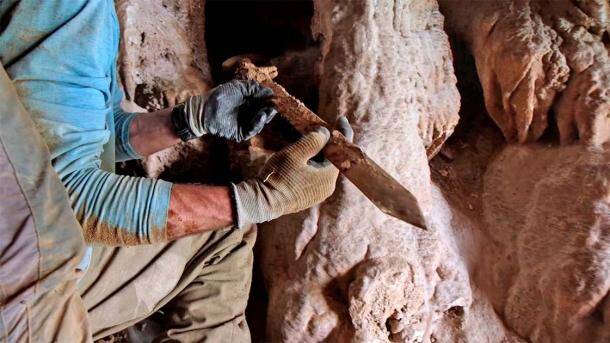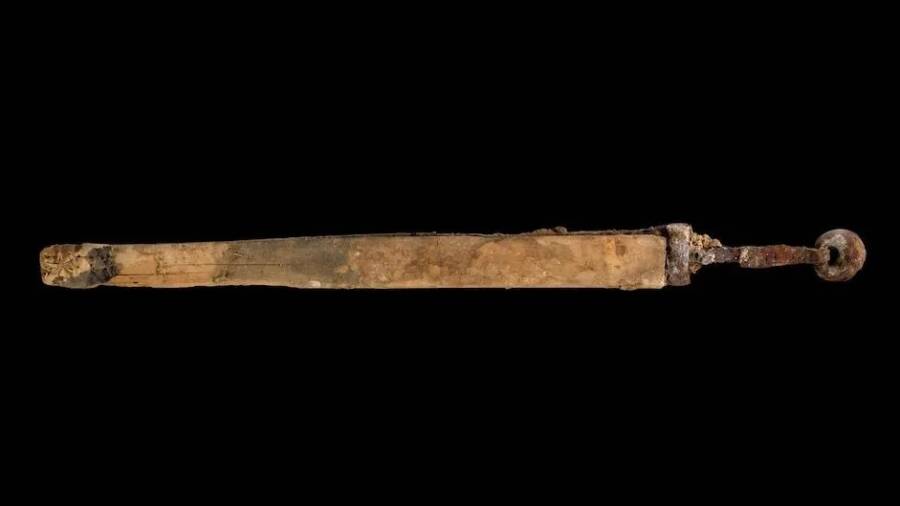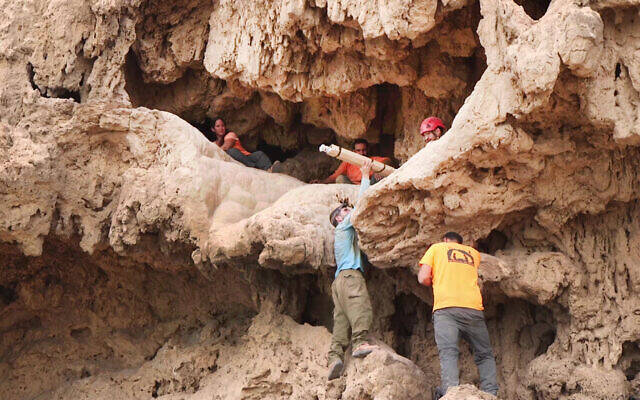Hidden within a fissure in a cliffside cave, swords were preserved by the arid climate of the Judean Desert in almost perfect condition for centuries.

IAAOne of the four Roman swords discovered by archaeologists in Israel.
In a cave in the Judean Desert, archaeologists have made a rare discovery: four 1,900-year-old Roman swords, which experts believe were taken as booty by Judean rebels during the Bar Kokhba revolt.
Archaeologists found the four swords in a small fissure inside the cave, which sits in what is now the Ein Gedi National Park near the Dead Sea. In a statement from the Israel Antiquities Authority (IAA), researchers were ecstatic.
“Finding a single sword is rare — so four? It’s a dream! We rubbed our eyes to believe it,” one said, according to CNN.
Three swords with iron blades were still protected in their wooden and leather sheaths, each measuring between 24 and 26 inches in the style of Roman “spatha” swords. The fourth sword was shorter, with a blade of just 18 inches, which experts classified as a ring-pommel sword.
“We’re talking about an extremely rare find, the likes of which have never been found in Israel,” said Eitan Klein, a director of the IAA’s Judean Desert Survey. “Four swords amazingly preserved, including the fine condition of the metal, the handles, and the scabbards.”
Per the Times of Israel, researchers were already clued into the cave’s value nearly 50 years ago when they discovered a stalactite with an inscription written in ancient Hebrew script characteristic of the First Temple period.

One of the 1,900-year-old Roman spatha swords recovered from the cave.
Three researchers — Asaf Gayer of Ariel University, geologist Boaz Langford of Hebrew University, and IAA photographer Shai Halevi — recently took a trip to the cave to photograph the stalactite with multispectral photography. This technique could help identify any parts of the inscription that the naked eye may not have been able to see.
While making their way through the cave, Gayer noticed something stuck in a narrow crack in the rock: a well-preserved Roman pilum. He investigated the shafted weapon and saw other objects also hidden in niches in the rock wall — including pieces of carved wood, which were revealed to be the scabbards of the four ancient swords.
The three researchers reported their findings to the IAA and returned with members of the Judean Desert Archaeological Survey team, led by Klein. It was then that they realized how monumental this discovery truly was.
Typically, materials such as leather and wood would not remain so well-preserved for such a long period of time, especially in wetter regions. The Judean Desert, however, has a fairly arid climate, which allowed for the immaculate preservation of these ancient materials.

IAAArchaeologists working to remove the hidden Roman swords.
“The blades have been preserved so well, they look like they could be picked up and used right now, even 2,000 years after they were forged,” said Langford. “You just realize that you are touching history, because here you are touching a find whose story you know.”
Researchers believe the weapons were likely stolen from Roman soldiers by Judean rebels, who hid them away in the cave either for later use or simply because they did not want to be caught with them.
The swords date back to the Bar Kokhba revolt, which lasted from 132 to 135 C.E., during which Jews living under Roman rule in Judea staged a rebellion led by a man named Simon Bar Kokhba. Since it would have been dangerous for any Jews to be caught with Roman weapons during this time, it explains why the weapons had to be hidden away.
Klein called the discovery “a very rare and unique find on an international level that will shed light on the last moments of the war between the Jewish rebels and the Roman army at the time of the Bar Kokhba revolt.”
The discovery also prompted the archaeology team to perform a thorough excavation of the cave. As a result, they also found artifacts from the Chalcolithic period, around 6,000 years ago, and other artifacts from the Roman period, dating back about 2,000 years. One of the recovered artifacts was a Bar Kokhba bronze coin from the time of the revolt, found at the entrance to the cave.
IAA director Eli Escusido called the find “a dramatic and exciting discovery, touching on a specific moment in time.”
After reading about the discovery of these Roman swords, read the story of the man who governed Judea a little over a century before the Kokhba Revolt, Pontius Pilate. Then, learn about another Dead Sea discovery when someone found part of the Dead Sea Scrolls in Montana.





